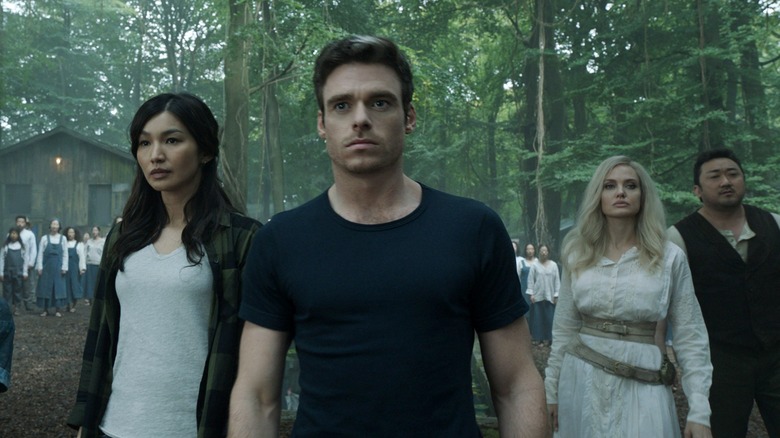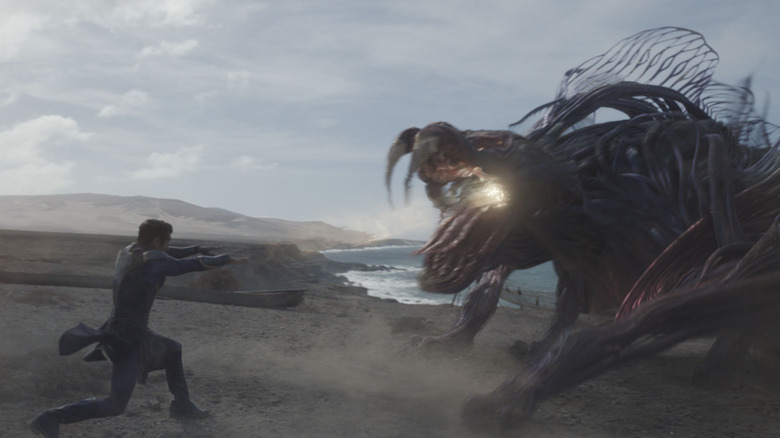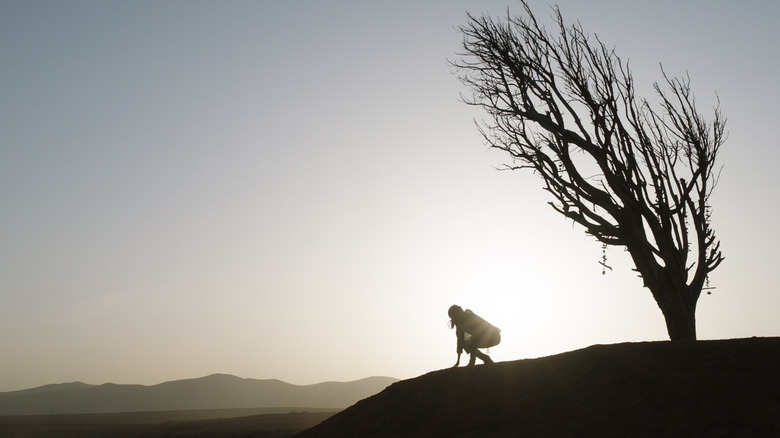Eternals Review: A Wildly Ambitious But Tonally Uneven Cosmic Epic
Throughout the long runtime of Marvel's "Eternals," I weirdly could not stop thinking about a random phrase from a season 2 sketch of "I Think You Should Leave with Tim Robinson." In that sketch, Santa Claus retires from delivering presents to children for the more lucrative job of starring in action movie cash grabs, which he enthusiastically promotes with the nonsense descriptor: "It's kind of a cosmic gumbo."
The phrase intentionally pokes fun at the movie biz practice of combining colorful adjectives in a way that sounds sophisticated, but actually means nothing. And that's the phrase that kept echoing through my head as I watched "Eternals," Marvel's most ambitious and majestic film yet. Now it sounds like I'm trashing "Eternals" — not at all. At best, I think it's the work of a singular director who brings with her a grand, awe-inspiring vision of austere science-fiction the likes of which has never been seen in Marvel before. At worst, I think it's a mixed bag. But "Eternals" does feel like a strange combination of a truly inspired filmmaker and a meticulously focus group-tested pitch, with director Chloé Zhao given all the tools at the studio's disposal to bring her vision to life. It's impressive and mythic and wild and dazzling, yet it also feels strangely diluted. So ... you might say it's a cosmic gumbo.
'In the Beginning...'
"Eternals" follows the titular group of immortal beings who were sent to Earth by a group of all-powerful cosmic entities known as the Celestials, some of the first lifeforms created in the universe. The Eternals are sent to defend the Earth from the Deviants, monstrous aliens that mindlessly devour any lifeform in its path. Led by the wise Ajak (a beatific Salma Hayek), the Eternals include the compassionate but naïve Sersi (Gemma Chan, practically the definition of "doe-eyed"), the group's pseudo-Superman member Ikaris (a deliciously dubious Richard Madden), the aggressive warrior Thena (Angelina Jolie, fragile and fierce in equal measure), and the finger gun-wielding Kingo (Kumail Nanjiani, having a blast).
Filling out the rest of this unlikely family are the youthful Sprite (Lia McHugh), who has the power to create illusions; Phastos (Brian Tyree Henry, injecting a deep sensitivity into his role), inventor extraordinaire; Makkari (Lauren Ridloff), a deaf speedster; Gilgamesh (Don Lee, an indomitable presence in and of itself), the strongest and kindest of the group; and finally, Druig (Barry Keoghan, playing with his inherently threatening energy), the member with the ability to manipulate the minds of others.
The group arrive on Earth in the prehistoric era, 7,000 years before the Avengers existed, with a simple mission: to eliminate all the Deviants. They're told not to interfere in human conflict, but are not discouraged from nudging along human progress, with Phastos introducing many an innovation to the humans, Sprite weaving some myths for the adoring humans, and Sersi aiding in the cultivation of crops. The film skips back and forth in time, as we pick up with Sersi in modern day, living amongst mortals and happy in a relationship with a fellow professor, Dane Whitman (Kit Harington, reveling in a lighter role for once). But her normal life is interrupted by an attack from a Deviant — the last of which the Eternals thought they had eliminated thousands of years ago — and the return of her longtime ex-lover, Ikaris. Terrified at the prospect of the Deviants returning, Sersi rallies Ikaris and Sprite to find the rest of the Eternals, who have scattered around the globe and have long abandoned humanity to their feckless ways.
A Shaky Start
From the beginning, "Eternals" was a big gamble for Marvel. The Jack Kirby-created comics upon which the movie is based are some of the trippiest things to come out of Marvel Comics — so eye-popping and visually dense that you'd think drugs were involved in its creation (for the record, Jack Kirby is very anti-drug). They're also quite niche, even for Marvel Studios. But Marvel was able to turn the formerly obscure Guardians of the Galaxy into its biggest superstars, so why not another group of cosmic superbeings?
To do that, they needed a strong creative hand, and they found that in Chloé Zhao. Zhao is possibly the biggest get for Marvel yet — a historic Oscar winner and a beloved auteur for her exquisite double bill neo-Westerns "The Rider" and "Nomadland." But her naturalistic style seemed at odds with the gonzo acid trip of Kirby's "Eternals." So how does it all shake out? With a movie that does eventually manage to find the perfect median between the mythic weirdness of Kirby's comics and Zhao's meditative naturalism. The only problem is that it takes a long time to get there.
The first half is, to put it mildly, rough. As Sersi, Ikaris, and Sprite travel the globe to find their fellow Eternals, the film weaves in flashbacks to the early days of their arrival, building to the group eventually fracturing. There's a dissonance in those flashbacks, which are filmed largely on-location in various fields and rock formations and are shot in that dusky magic hour which lovingly drapes so much of Zhao's films. The scenery is beautiful and the landscapes breathtaking, but it's inhabited awkwardly by the Eternals, who placidly stroll around the vistas in their stiff supersuits and spend half of the flashbacks lining up to pose in "superhero team" formation (I counted at least three times). There's probably some intent to the distance with which this insanely talented ensemble play the characters in this early half — they're told not to interfere with humans, but they come to care for them anyways — but it only undercuts the humanistic streak that Zhao brings to the film.
Marvel's Bleakest Film
It's only when the film's meditative tone (or attempt at doing so) gives way to the grand, brazenly weird mythos that "Eternals" starts to kick into gear. But even so, the most interesting seeds of "Eternals" are only hinted at, and only come to the surface toward the end of the film — and by then, it feels like the film has only just gotten started. Zhao employs a Villeneuve-inspired (i.e. sleek obelisk-style spaceships) aesthetic to convey the austere, incomprehensible vastness of space, and then brings out the indomitable Celestials — hulking, mammoth figures who loom over all creation and hint at a kind of cosmic horror.
The most intriguing part of "Eternals" is its subtext. "Eternals" is by far Marvel's bleakest film, essentially consigning humanity to inevitable destruction. It's not hard to see the climate change allegory in that worldview, but it's the kind of gutting revelation that basically gets breezed past by the film in favor of more people in spandex punching "World of Warcraft" monsters.
With "Eternals," Marvel turns a risky gamble into another piece of the puzzle. Its cosmic ambitions, its prevailing humanism amid a nihilistic outlook, and its gestures at maturity — the (real!) sex scene, the depth and warmth that they give to Henry's LGBTQ relationship — are not enough to make "Eternals" more than just another film to fit neatly in the Marvel Studios mold. But even so, Zhao brings an elegance to the film and the cast bring a vulnerability and care to their characters that leave a lingering impression, even as the last super-punch fades.
/Film Rating: 6.5 out of 10



